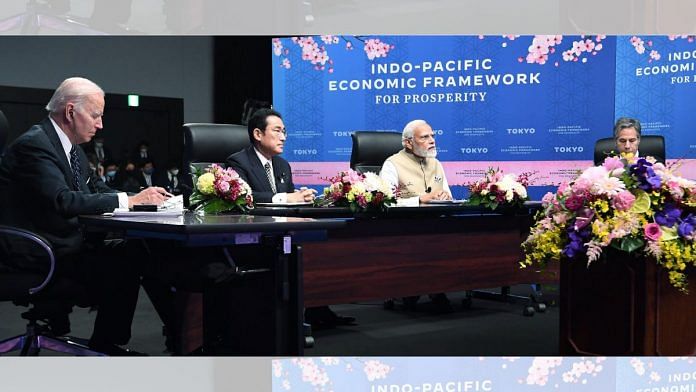New Delhi: The 14 partner countries of the Indo-Pacific Economic Framework for Prosperity (IPEF), including India, have successfully concluded negotiations for an international supply chain agreement, India’s Ministry of Commerce announced Sunday.
The IPEF, launched by the US and 12 other countries in May 2022, is a grouping that comprises more than 40 per cent of global GDP. The member countries currently include Australia, Brunei, Fiji, India, Indonesia, Japan, South Korea, Malaysia, New Zealand, the Philippines, Singapore, Thailand, Vietnam, and the USA.
The member countries have, since the inception of the IPEF, been trying to nail down an international agreement on a wide variety of issues or ‘pillars’, which include Trade, Supply Chains, Clean Economy, and Fair Economy. India is the only partner out of the 14 nations that is not a part of the Trade pillar.
The announcement on Sunday primarily had to do with the Supply Chains pillar.
The proposed agreement, “aims to increase the resilience, efficiency, productivity, sustainability, transparency, diversification, security, fairness and inclusivity,” of supply chains, through both collaborative activities and individual actions by each IPEF partner, read a press statement on the “substantial conclusion” of the negotiations, released by the U.S. Department of Commerce.
The IPEF partners also in a separate statement outlined the progress made under the other pillars of the IPEF.
“Reiterated India’s commitment towards building resilient supply chains and a clean & fair economy to spur further growth in the region,” tweeted Piyush Goyal, Minister of Commerce and Industry, who virtually participated in the IPEF discussions.
Virtually participated in the Indo-Pacific Economic Framework (IPEF) Ministerial Meeting held in Detroit, USA.
Reiterated India’s commitment towards building resilient supply chains and a clean & fair economy to spur further growth in the region. pic.twitter.com/LdWT7vAH5K
— Piyush Goyal (@PiyushGoyal) May 27, 2023
Goyal further commended the negotiating teams for “delivering an expeditiously negotiated, and mutually beneficial Agreement that could propel deeper integration of economies and supply/value chains within IPEF,” according to a statement released by the Ministry.
Also Read: G7 talks of restricting trade in Russian diamonds stoke unease in Surat, traders await ‘fine print’
IPEF supply chain agreement
Under the proposed agreement, the IPEF partners will seek to set up a framework to better understand supply chain risks — something that has come to the fore in a post-COVID world–and also support member countries in “identification and monitoring of its own critical sectors and key goods”.
The IPEF partners would also improve crisis coordination and response to supply chain disruptions, something that was a huge issue for economies around the world in 2020 and 2021 as they locked down to prevent the spread of COVID-19.
The proposed agreement would “facilitate cooperation, mobilise investments and promote regulatory transparency in sectors and goods critical to national security, public health and safety, or the prevention of significant or widespread economic disruptions,” according to the US Department of Commerce press statement cited earlier.
To support these efforts, the proposed agreement would create three new IPEF supply chain bodies to assist partner countries on supply chain issues. The three bodies are the IPEF Supply Chain Council, the IPEF Supply Chain Crisis Response Network, and the IPEF Labor Rights Advisory Board.
The IPEF Supply Chain Council, as the name suggests, will be tasked with setting up a way for partner countries to collaborate on sector-specific action plans for critical sectors and key goods to help enhance the resilience of supply chains.
As a part of the IPEF Supply Chain Crisis Network, the second body created under IPEF, the partner countries agreed to, “establish an emergency communications channel,” to help enable a faster response, which could minimise the negative effects of supply chain disruptions to an economy.
The agreement, when finalised and signed, would also see the setting up of a new advisory board, which consists of government, worker and employer representatives to promote labour rights, sustainable trade and investment, and facilitate opportunities for investment in businesses that respect labour rights.
All that is left for the agreement now is further domestic consultations, a legal review, and the preparation of the final text of the agreement. Once the text is finalised, the IPEF Supply Chain Agreement will have to be passed through each of the partner countries’ domestic processes before it can be signed and ratified.
Other pillars of the IPEF
Under the Clean Economy pillar, interested IPEF partners are introducing a regional hydrogen initiative to, “encourage widespread deployment of low-carbon and renewable hydrogen and its derivatives in the region”.
Goyal highlighted that “India would like the Pillar focus to be centred on action-oriented elements, such as mobilisation of low cost long tenure climate finance and enhanced access to clean energy technologies”.
On the progress under Fair Economy pillar, a press statement by the U.S. Department of Commerce highlighted the progress towards an agreement that would strengthen the implementation of anti-corruption and tax measures to, boost commerce, trade and investment among the partner countries.
Also Read: PM Modi, G7 & Quad outline strong stance against China. Beijing lodges ‘stern representations’



